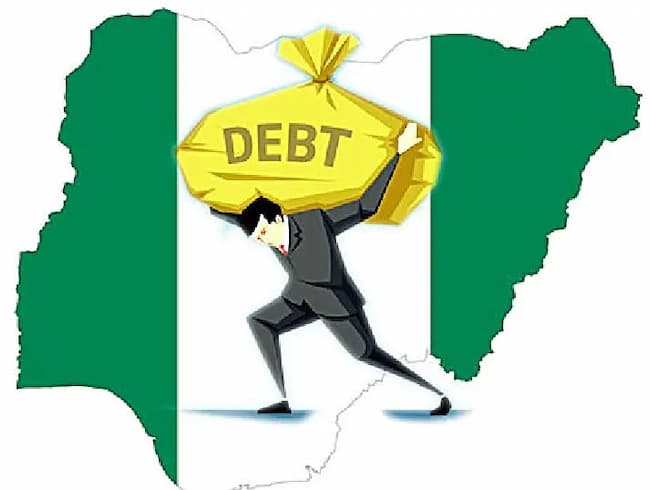Nigeria’s total public debt has surged to N144.67 trillion ($94.23 billion) as of December 31, 2024, representing a 48.58 per cent increase from the N97.34 trillion ($108.23 billion) recorded at the end of December 2023.
This was made known in the latest debt profile report released by the Debt Management Office (DMO).
The report also indicated a quarter-on-quarter increase of 1.65 per cent from the N142.32 trillion ($88.89 billion) recorded at the end of September 2024, highlighting a consistent upward trend in the nation’s debt load during the final quarter of the year.
An analysis of the debt data over the one-year period revealed that Nigeria’s public debt rose by N47.32 trillion, reflecting a 48.58 per cent year-on-year growth from December 2023 to December 2024.
This significant rise in public debt was primarily fueled by substantial increases in both external and domestic borrowings.
According to the report, Nigeria’s external debt jumped by 83.89 per cent from N38.22 trillion ($42.50 billion) in December 2023 to N70.29 trillion ($45.78 billion) by December 2024. This steep increase was attributed to new external loans as well as the impact of naira depreciation, which inflated the naira value of dollar-denominated obligations.
Similarly, domestic debt saw a 25.77 per cent rise, increasing from N59.12 trillion ($65.73 billion) at the end of December 2023 to N74.38 trillion ($48.44 billion) as of December 2024.
The Federal Government’s share of the domestic debt rose markedly from N53.26 trillion to N70.41 trillion, representing a 32.19 per cent increase. This underscores the administration’s continued dependence on domestic borrowing to cover fiscal deficits and fund infrastructure initiatives.
Conversely, the domestic debt held by state governments and the Federal Capital Territory (FCT) declined from N5.86 trillion to N3.97 trillion, marking a 32.27 per cent drop. This suggests a more conservative borrowing stance by several subnational entities during the period under review.
On a quarterly basis, the nation’s total public debt grew by N2.35 trillion, amounting to a 1.65 per cent increase from the N142.32 trillion recorded on September 30, 2024. This rise was driven by increments in both external and domestic debt portfolios.
External debt rose by N1.4 trillion, moving from N68.89 trillion ($43.03 billion) in September 2024 to N70.29 trillion ($45.78 billion) in December. The increase was a result of fresh foreign loan inflows in the last quarter, coupled with further depreciation of the naira.
Domestic debt also experienced a moderate 1.29 per cent increase, rising from N73.43 trillion ($45.87 billion) in September 2024 to N74.38 trillion ($48.44 billion) at the end of December. Within the same period, the Federal Government’s domestic debt rose from N69.22 trillion to N70.41 trillion.
Meanwhile, domestic debt attributable to states and the FCT declined from N4.21 trillion to N3.97 trillion, representing a 5.69 per cent drop.
As at December 2024, external debt constituted 48.59 per cent of Nigeria’s total public debt, while domestic debt accounted for 51.41 per cent. This reflects a relatively balanced debt structure.
Nevertheless, the uptick in external borrowings highlights a growing reliance on foreign debt to address fiscal shortfalls.
A breakdown of the external debt stock shows that the Federal Government accounted for N62.92 trillion ($40.98 billion), while state governments and the FCT collectively held N7.37 trillion ($4.80 billion).
In the domestic segment, the Federal Government was responsible for N70.41 trillion ($45.86 billion), while the states and FCT owed a combined N3.97 trillion ($2.58 billion).
The escalating public debt levels have sparked concerns among economic analysts regarding Nigeria’s long-term fiscal sustainability. The sharp rise, particularly in external obligations, has raised alarms over the country’s exposure to exchange rate volatility and global economic headwinds.
With the persistent weakening of the naira, the cost of servicing foreign debt is expected to increase, potentially placing further strain on Nigeria’s financial resources.












